The days of Summit Series and Canada Cup best-on-best tournaments seem to have faded into distant memory. Even a World Cup of Hockey has not taken place since 2016. While the NHL and the federations cannot seem to reestablish this grand event, imagined below is a World Cup comprised only of players who have played for the New Jersey Devils. Essentially, a best-on-best history of the Devils.
Ground Rules
To be eligible, a player has to have played for the Devils, just playing for the Colorado Rockies does not count. Some of the teams were made regional to be able to include the best players in team history. Due to the size of the rosters, this World Cup will be played in a 3-on-3 format akin to that played in the NHL regular season overtime. Assembled below are five teams with ten(ish) players each (six forwards, three defensemen, and a goalie).
Rosters
Team 1 – 1983-1995 Team Canada
- Kirk Muller – Forward – Former captain, Kirk Muller netted 520 points for the Devils in seven seasons. He also captained the Devils’ first-ever playoff team at the age of 21.
- John MacLean – Forward – The brash forward was the first-ever draft pick by New Jersey. He scored 701 points in parts of 14 seasons with the Devils. He was the first true superstar in team history and still ranks second in team history in points and goals.
- Claude Lemieux – Forward – The 1995 Conn Smythe winner only played with the team for six seasons but saved his best for last, rising to the occasion to lead the team to its first Stanley Cup. Lemieux was a consummate two-way forward who had a knack for making key plays in big moments.
Related: Devils Top 10 American Players
- Pat Verbeek – Forward – The diminutive Pat Verbeek was a mainstay on the Devils’ teams of the 80s. Despite not having played for the team since 1989, he remains seventh in career goals with 170. He retired with over 1,000 points in a 20-year career.
- Brendan Shanahan – Forward – The prototypical power forward did not have a long career with the Devils but it was certainly impactful. In just five seasons he put up 228 points and 553 penalty minutes. In his storied Hall of Fame career, he won three Stanley Cups and was named to the NHL’s 100th Anniversary Team.
- Stephane Richer – Forward – The final forward on the roster, Richer played six seasons for the Devils amassing 283 points. He was the team leader in regular season and postseason points during the lockout-shortened 1995 season which ended in the team winning the Cup.
- Scott Stevens – Defenseman – Hall of Famer Scott Stevens was the heart and soul of the Cup-winning Devils teams. He captained all three championship squads and transformed his game from an offense-first defenseman in his time with the Washington Capitals to one of the best two-way defensemen in the history of the NHL.
- Bruce Driver – Defenseman – Bruce Driver was a mainstay on the Devils’ blue line from the team’s second season through their first Stanley Cup. He served as captain between the Muller and Stevens eras. A contributor on both the power play and penalty kill, he remains eighth in all-time career assists and 11th in points for the team.
- Ken Daneyko – Defenseman – Known throughout the fanbase as “Mr. Devil”, the son of Alberta is synonymous with the evolution of the Devils from a Mickey Mouse franchise to a perennial Cup contender. Daneyko is the all-time team leader in games played both in the regular season and playoffs. His toughness and ability to shut down opponents’ top lines made him essential to the team’s success.
- Sean Burke – Goaltender – Few players have ever burst onto the NHL scene brighter than Sean Burke. As a rookie, he rode a 10-1-0 streak late in the 1988 season to propel the Devils to their first-ever playoff appearance. That season he backstopped the team to the conference final. While he never regained that form again for the Devils, there are few fans from that era that don’t recall him with fond memories.
- Chico Resch – Goaltender – Yes, the rules are only 10 players per team and only one goalie, however, no Devils list is complete without Chico Resch. His now 40-year association with the organization began with him agreeing to sign with the team as a favor to then-general manager Billy MacMillan. Lost in his stellar broadcasting career is that Resch was an excellent goaltender and finished second to Brian Trottier in the 1976 Calder Trophy voting.
Team 2 – 1996 – Present Team Canada
- John Madden – Forward – One of the best two-way forwards of his era, Madden was a perennial Selke Trophy finalist and did claim the trophy once. A ten-year Devils career highlighted by two Stanley Cup victories, he remains the team leader in career shorthanded goals with 17.
- Jason Arnott – Forward – The borderline Hall of Famer was a mainstay of the 2000 and 2001 Stanley Cup Finals teams. He was the prototypical power forward of his era and scored 245 points in his six years as a Devils player. Jason Arnott also had a knack for performing in the playoffs, leading the 2000 Stanley Cup winners with 20 postseason points including the championship-clinching goal.
- Travis Zajac – Forward – Along with Zach Parise and Andy Greene, one of the best Devils ever to have not won a Cup. Zajac was the ultimate dependable two-way forward. Logging 15 years in a Devils sweater, he remains fourth all-time in games played, third in points, and is in the top five of both career power play and shorthanded goals.
- Randy McKay – Forward – Known for his toughness as part of the “Crash Line”, Randy McKay was a key part of the identity the Devils built on the way to their first two Cups. He remains second in team history with 1,418 career penalty minutes. He was not just an enforcer though as he had multiple 20-goal seasons.
- Joe Nieuwendyk – Forward – Joe Nieuwendyk is one of the greatest players in NHL history. He joined the Devils later in his career but his experience and leadership were factors on the way to the 2003 Cup. He wasn’t just along for the ride as he had a significant impact on the power play and averaged about .5 points per game in the playoffs.
- Adam Henrique – Forward – For a certain group of the fanbase the words, “Henrique, it’s over” have as much resonance as the calls from any of the three Cup runs. The series-winning overtime goal in Game 6 of the Eastern Conference Final will forever be etched into Devils lore, and alongside Doc Emerick’s legendary call is the pure joy of Henrique’s celebration.
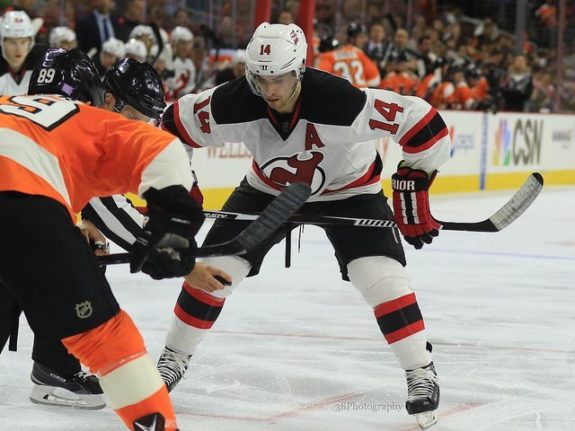
- Scott Niedermayer – Defenseman – Arguably one of the top five all-around defensemen of all time, there are few words that accurately describe Scott Niedermayer. The Hall of Famer won four Cups, a Norris Trophy, a Conn Smythe, and is possibly the best all-around skater to ever play for the team.
- Bryce Salvador – Defenseman – The epitome of a team-first player, Bryce Salvador built a 15-year NHL career on being willing to do whatever it took for his team to win. Not known for his offensive game, he was a tenacious defender counted on to kill penalties and block shots. His season stats from the 2012 run to the Cup Final are indicative of his career, averaging over 20 minutes of ice time while blocking 107 shots and being credited with 106 hits. His leadership impressed the team so much that he was named captain the following season.
- Dougie Hamilton – Defenseman – Arguably the biggest free agent signing the Devils made in the last 20 years. Hamilton is a perennial contender for the Norris Trophy and one of the premier offensive defensemen in the NHL. After an injury-riddled first season, he returned in his second campaign to produce at an elite level, especially in the clutch. He was second on the team with seven game-winning goals, a franchise record for defensemen, and set the team record for most goals by a defenseman with 22.
- Martin Brodeur – Goaltender – Devils fans believe that Brodeur is the greatest goalie of all time. Few could argue that he is not at least in the top five. He was durable, clutch, and the best puckhandling goalie of all time. He outpaces the competition at his position farther than anyone else on these rosters.
Team 3 – USA
- Scott Gomez – Forward – The Anchorage, Alaska native burst on the scene in the Devils’ 2000 Stanley Cup season notching 70 points on the way to the Calder Trophy. He won two Cups with the Devils and remains in the team’s top five all-time in assists and points. Gomez also led the NHL in assists and is only one of ten Devils to score 84 points or more in a season.
- Zach Parise – Forward – Parise captained the Devils to their most recent Stanley Cup Final appearance. A dynamic offensive player in his time with New Jersey, he scored 410 points in 502 games. Parise scored over 30 goals in a season five times and currently sits in fifth place all-time in franchise goals with 194.
- Brian Gionta – Forward – Still the Devils’ single-season goals record holder, Brian Gionta was a vital part of the 2003 Stanley Cup team. He thrived on the “EGG line” with Gomez and Patrik Elias, where in the 2005-06 season the entire line averaged more than a point per game.
- Jack Hughes – The first-overall draft pick in 2019 has emerged as a superstar breaking the team’s single-season points record in his fourth season. There is a good chance that when he retires he will hold all the scoring records in team history. Simply put, there has never been a more talented homegrown Devils player than Hughes.
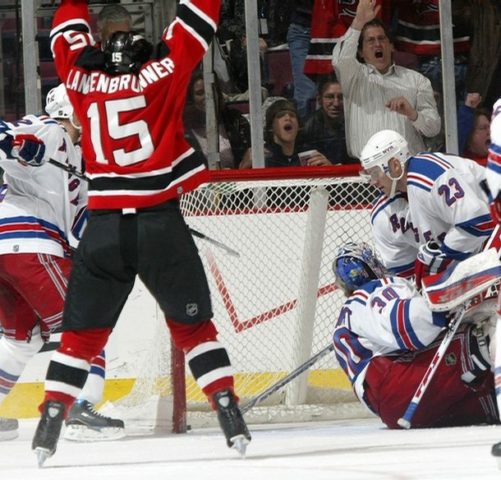
- Jamie Langenbrunner – Forward – Known for his leadership and clutch play, Jamie Langenbrunner was named the eighth captain of the Devils in 2007. Over the course of his nine years in New Jersey, he scored 32 game-winning goals, the fifth most in team history.
- Brian Rolston – Forward – Known for his heavy shot, Brian Rolston was a tough, two-way forward who scored ten shorthanded goals over his nine seasons with the Devils. He also remains tenth in team history with 26 game-winning goals and was part of the first Devils Stanley Cup-winning team in 1995.
- Aaron Broten – Forward – One of the original Devils, the oft-forgotten Aaron Broten was one of the best forwards in the team’s first decade. Now, 35 years later, he remains on the team’s top ten in points with 430. He was one of the best players on the Devils’ first playoff team, finishing second on the team in points in the regular season and third in the postseason.
- Brian Rafalski – Defenseman – A puck-moving defenseman ahead of his time, Brian Rafalski was often overshadowed by his more heralded teammates Stevens and Niedermayer, but he was an integral part of two championships. He still holds the team record for playoff power play goals and points. He was a workhorse, averaging over 22 minutes a game often alongside Stevens matched against the other teams’ top lines.
- Andy Greene – Defenseman – The story of Andy Greene‘s career almost reads like a Hollywood script. From undrafted to respected team captain is an unusual path but one that demonstrates the depth of respect the organization and his teammates held for Greene. Despite never notching 40 points in a season, he evolved into one of the most dependable players in team history and may be the most underrated. He currently sits fourth all-time on the team’s defensive point shares for his career.
- Paul Martin – Defenseman – In six seasons and 400 games, Paul Martin averaged over 23 minutes of ice time for the Devils. Known for his hockey IQ and strong fundamental defensive play, he also contributed on the power play scoring 70 power play points for New Jersey.
- Luke Hughes – Defenseman – Sure, he has only played two regular season games in his career, but he certainly appears like he belongs. Like his brother Jack, he has elite skating skills, is a tremendous puck mover, and is an underrated defender. The Devils showed faith in him during the playoffs, putting him in the lineup for three games and deploying him for over 25 minutes in an elimination game. The future is bright.
- Cory Schneider – Goaltender – The Devils acquired Cory Schneider for a draft pick that turned out to be Bo Horvat. The trade remains one of the more disputed draft day trades in Devils’ history. Since Brodeur’s retirement, the Devils struggled to find an adequate replacement and looked at Schneider as the answer. The ultimate reviews were mixed but there is no denying his talent. He finished his six seasons with the team with a .915 save percentage (SV%) and a 2.50 goals-against average (GAA) and has the second-highest goalie point shares behind Brodeur. Arguments could certainly be made for Chris Terreri, Keith Kinkaid, or Scott Clemmensen as well.
Team 4 – Eastern(ish) Europe
- Ilya Kovalchuk – Forward – Despite signing a colossal 17-year contract with the Devils, Ilya Kovalchuk only played four seasons in New Jersey. In those four seasons, there was little doubt why a team would want to lock him up long-term. He was nearly a point-per-game player over those seasons and was an integral part of the team’s run to the Stanley Cup Final in 2012 leading the team with eight goals.
- Alexander Mogilny – Forward – Few argue that Alexander Mogilny is the best NHL player not currently in the Hall of Fame. As a Devil he went to two Stanley Cup Finals, winning one and putting up 114 points in 121 games.
- Patrik Elias – Forward – There is little doubt that Patrik Elias is the best forward in team history. He was a part of three Stanley Cup Final teams, winning two. He is the current team leader in goals, assists, points, offensive point shares and is third in games played. His No. 26 hangs from the rafters and deservedly so; many believe a bust in Toronto should be next.
- Bobby Holik – Forward – This member of the “Crash Line” spent 11 of his 18 NHL seasons in New Jersey and currently sits third in goals and seventh in all-time points. Holik evolved over the course of his time with the team from a tough checking forward to a feared offensive power forward. He is a two-time Cup winner with the team.
- Petr Sykora – Forward – An instrumental member of the 2000 Stanley Cup team and part of the “A” Line with Elias and Arnott that took over the series. In his eight seasons with the Devils, Sykora scored 166 goals, good for eighth best all time, 31 of which were game-winners.
- Sergei Brylin – Forward – Part of the five player contingent that was a member of all three Cup-winning teams, the player nicknamed “Sarge” is a consummate winner. Sergei Brylin has a strong case for being the sixth Devils player to have his number retired alongside the other four who won three Cups and Elias. One of the stand-out defensive forwards of his time, his versatility in playing all three forward positions was a key to the team’s success.
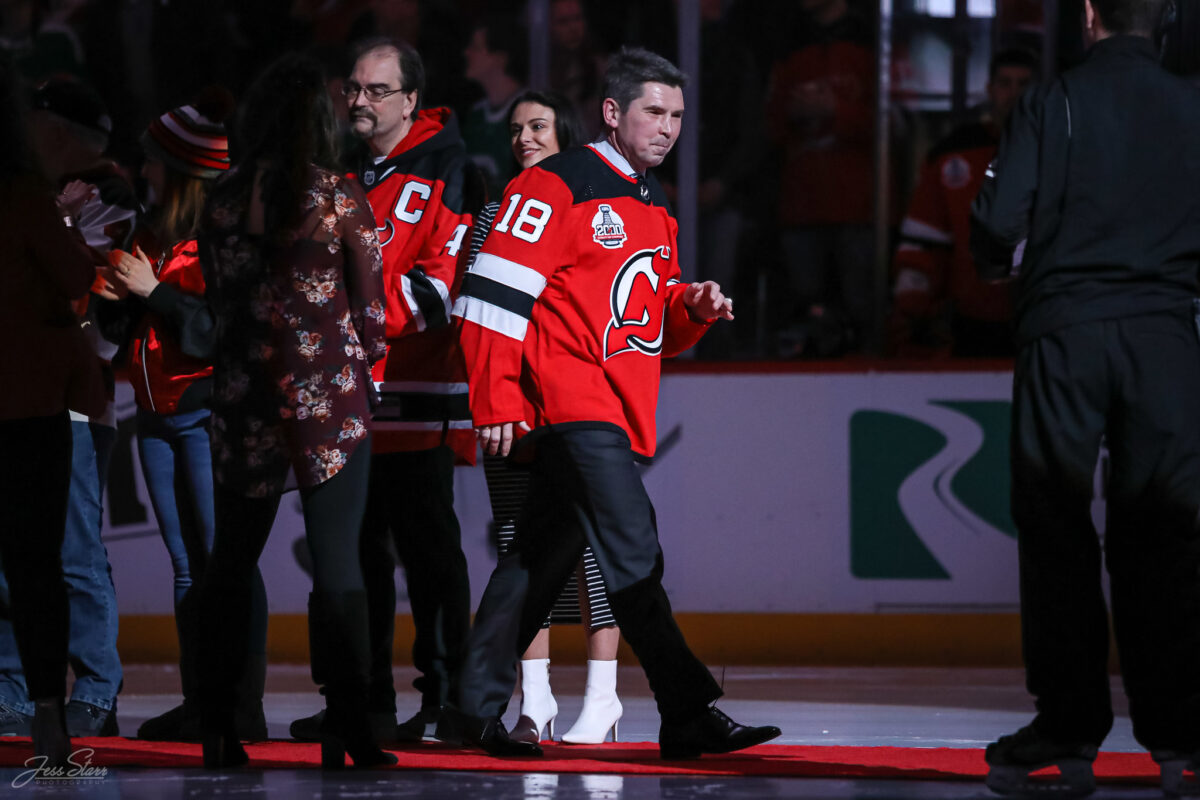
- Viacheslav Fetisov – Defenseman – After a stellar international career, Viacheslav Fetisov joined the NHL at the age of 31. Despite being a few years removed from his prime he still was an impactful player in his time with the Devils and Detroit Red Wings. He was enshrined in the Hockey Hall of Fame after his retirement, and Wayne Gretzky called him one of the two best defensemen he had ever played against.
- Alexei Kasatonov – Defenseman – Like his defensive partner Fetisov, Alexei Kasatonov came to the NHL after turning 30. He was a big, mobile defenseman who had the ability to score and move the puck. In some ways, his style was more suited for North America and he adapted quicker than Fetisov.
- Marek Zidlicky – Defenseman – The offensive-minded defenseman was a big lift to the 2012 Stanley Cup Final team arriving later in the season. He contributed 92 points in 214 games, and 14 of his 22 tallies as a Devil came on the power play.
- Vitek Vanecek – Goaltender – One of the NHL’s biggest surprises in the first half of the 2022-23 season was the emergence of Vitek Vanecek as a bonafide starter for a team in contention. He quickly became a crowd favorite and produced the only 30-win season for a goalie in team history not named Brodeur. While his performance in the playoffs was alarming, his overall numbers of .911 SV% and 2.45 GAA were well above the league average and a major reason the Devils set team records for wins and points.
Team 5 North/West Europe (& Jagr)
- Nico Hischier – Forward – The consummate two-way forward and Selke Trophy finalist, Nico Hischier is the catalyst for the Devils’ current resurgence. The former first-overall draft pick in 2017 has shown steady improvement each year of his career. He also has a knack for scoring big goals, as he led the 2022-23 team in game-winning goals.
- Timo Meier – Forward – While Hischier’s Swiss countryman has thus far only played a quarter of a season for the Devils, his impact has been felt. Timo Meier was the team leader in goals from the time he debuted through the end of the regular season. He is the prototypical modern power forward combining play driving, physical board play, and a lethal scorer’s touch. The eight-year deal he signed this offseason ensures he will be in New Jersey through his prime.
- Jesper Bratt – Forward – Another player who recently inked an eight-year deal is speedy forward Jesper Bratt. His mercurial rise from unheralded sixth-round pick to team points leader earned him that contract and a place in the hearts of New Jersey fans. His calm demeanor belies a strong competitive edge and elite skating ability that he mixes with a quick and accurate release.
- Jaromir Jagr – Forward – Unlike the three players just above him, Jaromir Jagr was not a Devil in his prime years, however, he was certainly productive. The sure-fire Hall of Fame forward is one of the all-time NHL greats. He played parts of two seasons with the Devils, after he turned 40, and still amassed 96 points in 139 games.
- Patrik Sundstrom – Forward – One of the best two-way forwards of the early Devils era, Patrick Sundstrom arrived via trade from the Vancouver Canucks and made an instant impact. In five seasons with the Devils, he scored 246 points and contributed on both the power play and penalty kill. He will be most remembered for his eight-point game in the playoffs against the Washington Capitals, and his 20-point performance as part of the Devils’ magical run to the conference final in their first foray into the playoffs.
- Peter Stastny – Forward – The Hall of Famer was largely known for his time in Quebec, but his arrival in New Jersey began the playoff run that culminated in the team’s first Stanley Cup. In four seasons with the team, he scored 173 points in 217 games and was a point-per-game player in the playoffs.
- Tommy Albelin – Defenseman – Tommy Albelin played 12 seasons for New Jersey and was a part of two Cup winners. Often relegated to the third pair, he was always reliable, sound defensively, and able to chip in offensively. He contributed eight points in the run to the 1995 Stanley Cup and 22 overall in 77 playoff games.
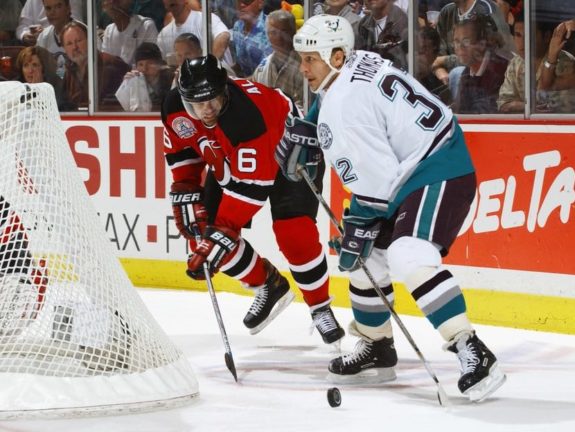
- Johnny Oduya – Defenseman – Oduya spent the first four years of his career with the Devils and was known for being a physical, puck-moving defenseman who joined the play and could find the back of the net. He finished his Devils career with 70 points in 273 games and was part of the trade that brought Kovalchuck to New Jersey.
- Adam Larsson – Defenseman – Like Oduya, Adam Larsson is notorious in Devils’ lore for a trade. In his case, he was swapped for Taylor Hall who went on to win the Hart Trophy in 2017-18. However, Larsson’s play in his five seasons with the Devils should not be overlooked. He joined the team during the run to the 2012 Stanley Cup Final and remained a steady contributor until he was traded and continues to play in the NHL with the Seattle Kraken entering his 13th season.
- Johan Hedberg – Goaltender – Johan Hedberg finished out his career playing for the Devils, largely serving as a backup at the end of Brodeur’s illustrious career. In 80 games he posted a .908 SV% and a 2.42 GAA, both very respectable and helped ensure the success of those teams.
Tournament
Without Doc Brown or Bill S. Preston, Esq. allowing the use of one of their time machines, there is no way to settle this on the ice. Someone more tech-savvy (i.e. younger) may be able to find a way to create a realistic simulation on a video game platform. Absent that, the teams will be power ranked in four categories, then a finals match that will be decided by the readers.
Ranking Criteria
The teams will be ranked 1-5 with one being the strongest and five the weakest in the following categories:
- Forward Corps
- Defense Corps
- Goalie
- Adaptability to the 3v3 game format.
All ratings are purely subjective and should be taken in good fun, especially if you stuck with it through the first 3,500(ish) words.
Forward Corps
- Team 4 Eastern(ish) Europe
- Team 1 Old Canada
- Team 5 North/West Europe
- Team 3 Team USA
- Team 2 Newer Canada
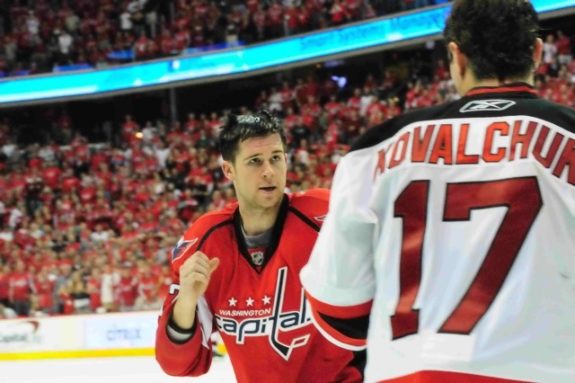
This is a really tough call, but the depth of Hall-of-Fame caliber players on Team 4 carries the day. The choice for third place was the most difficult, but in the end, Team 5’s depth puts it just above Team 3.
Defensive Corps
- Team 2 New Canada
- Team 1 Old Canada
- Team 3 USA
- Team 4 Eastern(ish) Europe
- Team 5 North/West Europe
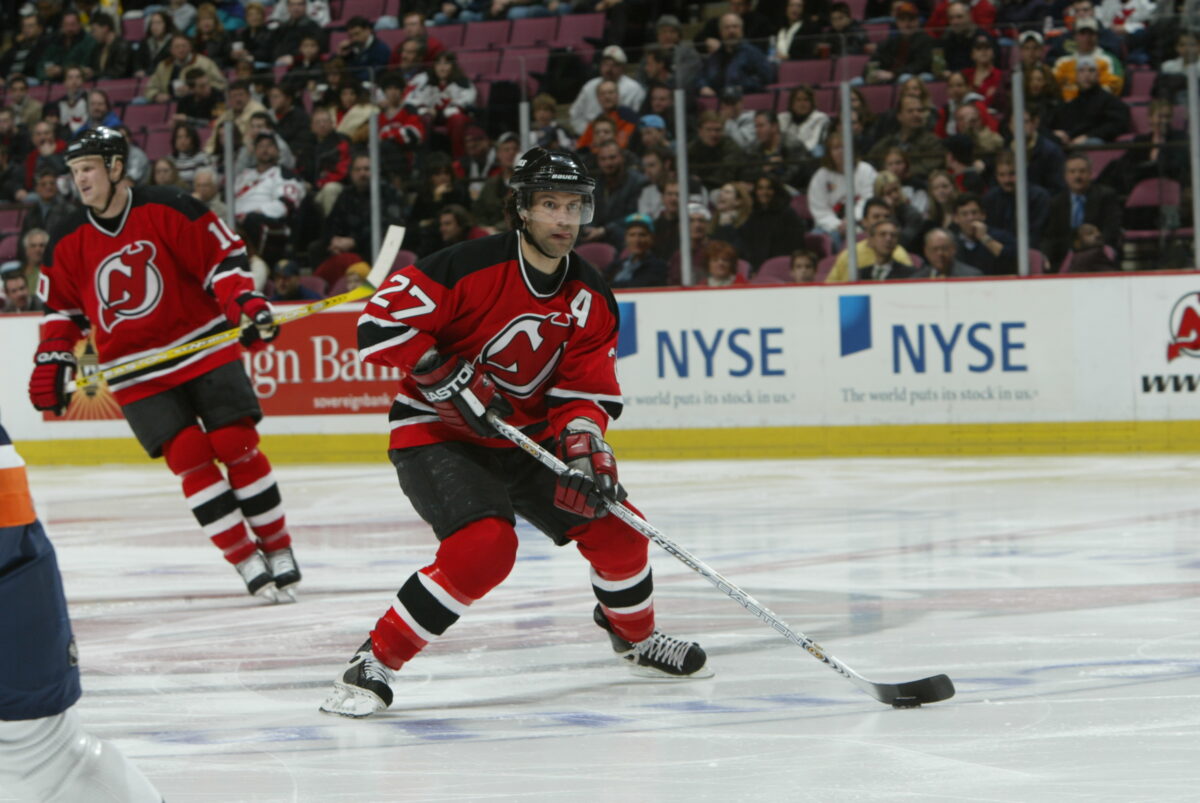
Choosing between Niedermayer and Stevens is a difficult task, but the depth of Hamilton seals it for New Canada. Given a few years there would be a chance that the USA team could leapfrog Old Canada if Luke Hughes becomes the Norris Trophy-level player many think he will.
Goaltending
- Team 2 New Canada
- Team 3 USA
- Team 1 Old Canada
- Team 4 Eastern(ish) Europe
- Team 5 North/West Europe
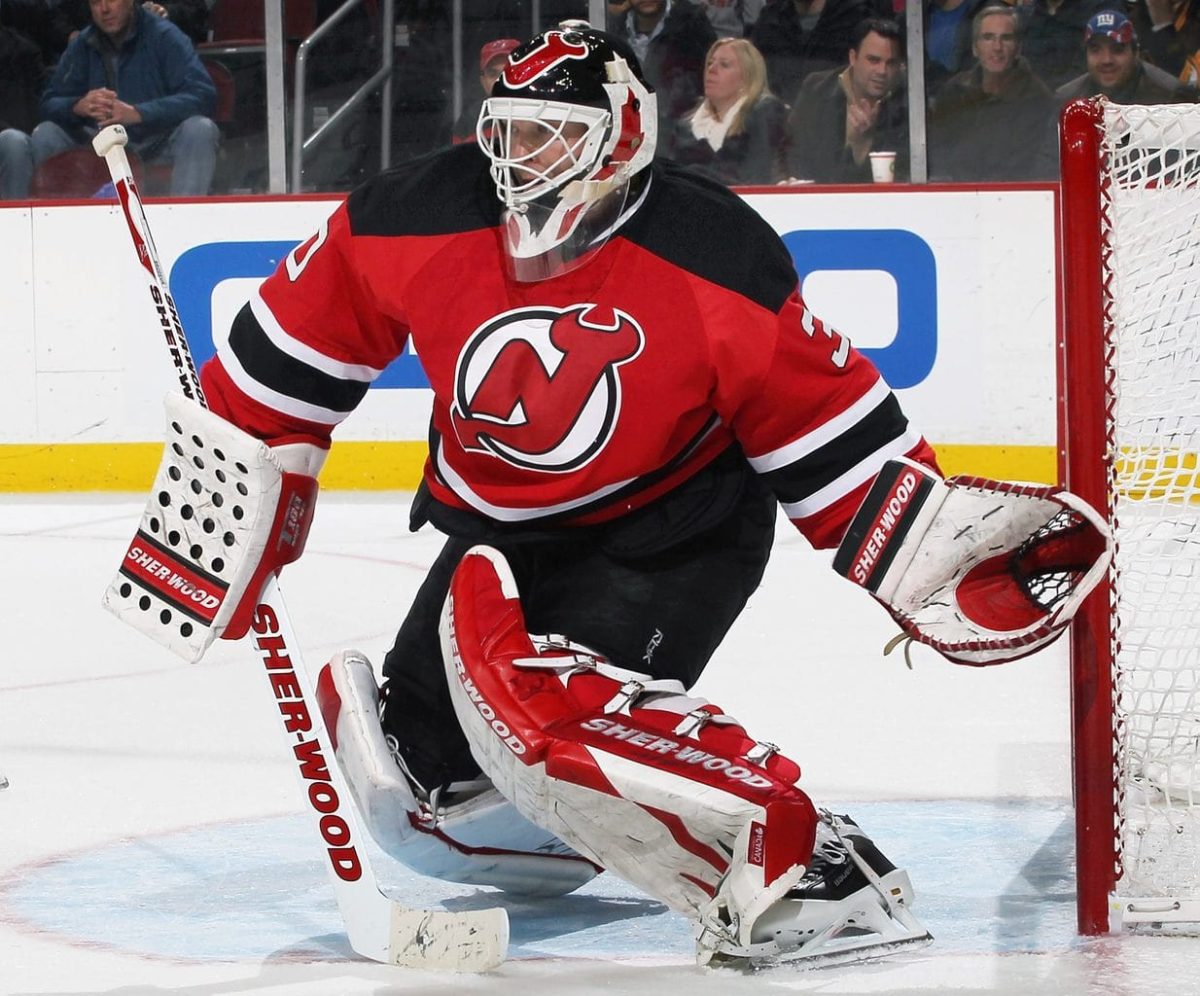
This was the easiest choice in the entire project. There probably should be a gap between Brodeur and everyone else. There were tough calls between Schneider and Burke/Resch and then between Vanecek and Hedberg, but at the end of the day, Vanecek’s 30-win regular season puts him above Hedberg.
Adapting to the 3v3 Format
- Team 3 USA
- Team 4 Eastern(ish) Europe
- Team 5 North/West Europe
- Team 1 Old Canada
- Team 2 New Canada
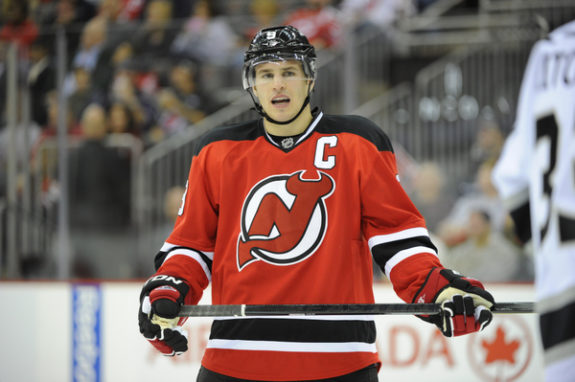
Another giant crapshoot. It’s difficult to imagine matching up with Parise, Hughes, and Rafalski, though Kovalchuk, Mogilny, and Fetisov come close. Team 5 suffers because of their lack of a top-tier defenseman.
Results
- USA – 10 points
- Tie Old Canada & Eastern(ish) Europe 11 points
- New Canada 12 points
- North/West Europe 16 points
Now it is up to the readers. Who do you have: the speed of Hughes, Parise, Gionta, and Rafalski; the power of Muller, MacLean, Shanahan, and Stevens, or the skill of Kovalchuk, Mogilny, Elias, and Fetisov?
